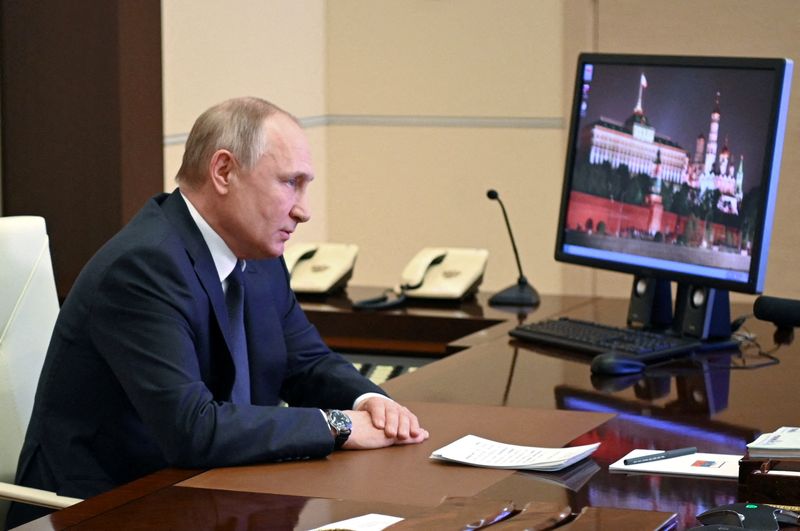LONDON (Reuters) -President Vladimir Putin on Wednesday delivered a stark warning to Russian "traitors" who he said the West wanted to use as a "fifth column" to destroy the country.
The Kremlin leader assailed Russians who he said were more mentally in tune with the West than Russia, and said the Russian people would quickly be able to tell the difference between traitors and patriots.
"Of course they (the West) will try to bet on the so-called fifth column, on traitors - on those who earn their money here, but live over there. Live, not in the geographical sense, but in the sense of their thoughts, their slavish thinking," he told government ministers, three weeks into Russia's war with Ukraine.
"Any people, and especially the Russian people, will always be able to distinguish the true patriots from the scum and the traitors, and just to spit them out like a midge that accidentally flew into their mouths."
The venomous tone was striking even for Putin, who has for years been cracking down on domestic opponents and delivering bitter tirades against the West.
Russian opposition politician Mikhail Kasyanov, who served as Putin's first prime minister in the early 2000s, condemned the remarks on Twitter (NYSE:TWTR).
"Putin is intensifying his actions to destroy Russia and is essentially announcing the start of mass repressions against those who don't agree with the regime," he said. "This has happened in our history before, and not only ours."
"SELF-CLEANSING"
Putin said the West was trying to divide Russia and provoke civil confrontation with the help of its "fifth column".
"And there is one aim - the destruction of Russia," he said, adding that Russia would repel such efforts.
"I am convinced that this natural and necessary self-cleansing of society will only strengthen our country, our solidarity, cohesion and readiness to meet any challenge."
Russia experts said the message was chilling.
"Putin in an Orwellian way has divided the citizens of Russia into clean and unclean," wrote Andrei Kolesnikov, a Moscow-based political analyst.
Since the Feb. 24 invasion of Ukraine, dissent in Russia has become even more dangerous.
A law passed on March 4 makes public actions aimed at "discrediting" Russia's army illegal, and bans the spread of fake news, or the "public dissemination of deliberately false information about the use of the Armed Forces of the Russian Federation".
Thousands of people have been detained while protesting against the war, which Russia calls a special military operation to demilitarise and "denazify" its democratic neighbour.

Several leading independent media organisations have suspended their operations.
Russia has opened at least three criminal cases against people for spreading what it calls fake news about the Russian army on Instagram and other social media, the Investigative Committee law enforcement agency said on Wednesday.